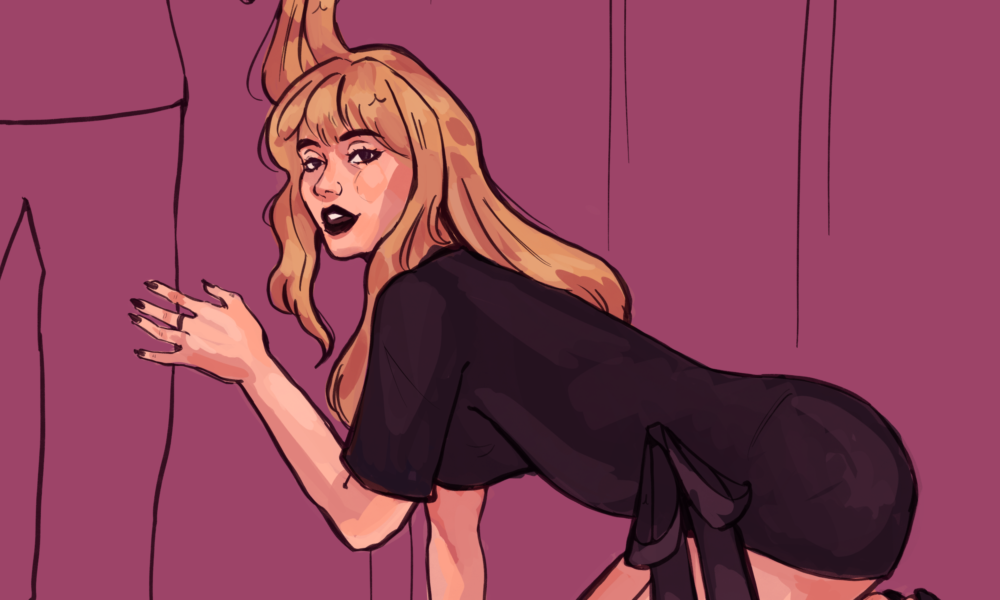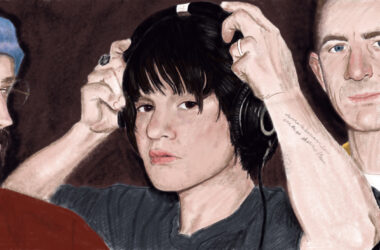On Aug. 29, Sabrina Carpenter released her album Man’s Best Friend. But the real conversation began months earlier—on June 11—when she unveiled the provocative cover art on Instagram. It features Carpenter on all fours, in a black mini-dress and high heels, as an anonymous man grips her by the hair. A second promotional image shows a dog with the album’s name on its collar, an idiom for unquestionable loyalty to one’s owner.
Critics slammed the cover as “deeply irresponsible,” “regressive,” and “insanely misogynistic,” with some saying it “set women back like 100 years.” However, such outrage misses the point. Carpenter is not glamorizing subservience but rather confronting it.
Listeners should understand the album as a self-aware journey. In “Tears,” Carpenter confesses that she gets turned on by the bare minimum: A man who does the dishes, communicates well, and listens. She is not celebrating low standards, but mocking how women are conditioned to reward basic decency. Her irony is clear—she knows it’s absurd, and still, she finds sexual pleasure in it. Digging deeper in “My Man on Willpower,” she watches a former partner prioritize his personal growth so much that he loses devotion to her. Despite her numerous attempts at seduction, he drifts. The song exposes her desperation for male attention, likening her own loyalty to that of a dog. However, the closing track, “Goodbye,” is different. Channeling ABBA’s “Voulez-Vous” and “Take a Chance on Me,” she ends on an empowered note. Her ex wants her back, but she refuses, reminding him that it was he who said goodbye. She finally chooses herself.
Both the album and its cover cynically reflect the idea that accepting the bare minimum is akin to being ‘man’s best friend.’ She ridicules her own submission to the male gaze through cheeky lines while reclaiming agency. The message isn’t inspirational, but it’s honest: Even when her standards disappoint, she maintains control over her sexuality.
Girl’s worst nightmare: Where was the puppy love?
Jamie Xie, Staff Writer
In Short n’ Sweet, Carpenter reinvents herself, pivoting from vulnerable Emails I Can’t Send confessional pop to popstar parody. In Man’s Best Friend, she promises one whole hour of all things sex in 4/4 metre as her winking Mae West persona. It comes across as if Carpenter is a little too comfortable in her endeavours to subvert expectations and create a post-ironic, sexually-liberated, feminist image—perhaps at the expense of subtlety and substantive commentary. While her irony represents a refreshing take on the pop genre, her work lacks the intentionality needed to challenge existing patriarchal power structures. Carpenter’s album does very little to engage thoughtfully with criticism of commodified sexuality, falling victim to a lack of creative direction.
The album’s only lead single, “Manchild,” delivers a performance that comes across not only as formulaic but also derivative of her previous works. Echoing “Busy Woman” musical motifs but falling upon himbo cliches established in “Sharpest Tool.”“House Tour,” and “Sugar Talking,” display the album’s core through retro 80s Nu-disco synths—a safer genre direction than she seemed to be promising with the country elements used in “Slim Pickins” and “Manchild.”
Her strongest songs—“Go Go Juice,” “We Almost Broke Up Last Night,” and “My Man on Willpower”—barely tease this idea of developing Carpenter’s persona by making light of herself. What if Carpenter didn’t have all the answers? Could it be possible that she might not have as much control over her relationships as she would lead us to believe? On “Go Go Juice,” Carpenter is at her apex with her lyricism, creating a vignette of a messy but sympathetic woman running on boozy brunch and pure hope, all in a tight three-minute timeframe.
Worse than being regressive, Man’s Best Friend suffers from the true crime of a distinct lack of imagination in the audience’s taste—symptoms of a desire to shock and please. Underlying the album are notes of insecurity that Carpenter is aware that the public’s adoration is difficult to hold. The current pop fixation on her may possibly be as short as it was once sweet.









